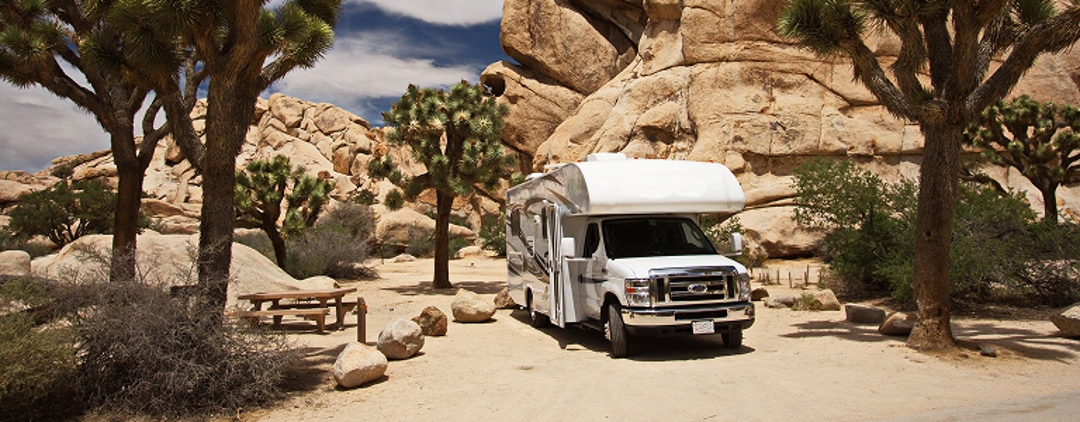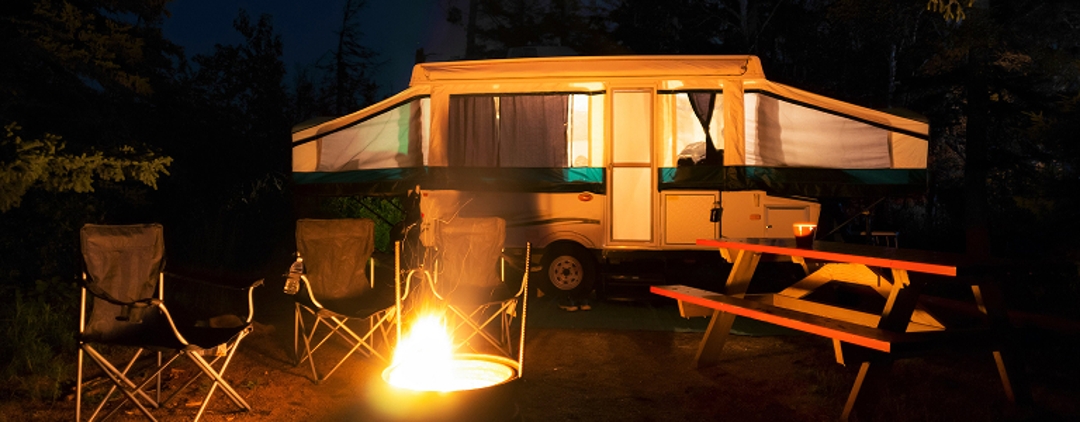What are the different types of RVs?
RVs are usually divided into two broad categories: motorhomes and trailers. The main difference between motorhomes vs trailers is that you can drive motorhomes while trailers need another vehicle to tow them. There are different types of RVs within these broad categories depending on the RV's size, layout, amenities, and kind of chassis.
Explore Progressive's editorial standards for Answers articles to find out why you can trust the insurance information you find here.
Jump to a section using the links below to learn more about each type of RV.
Types of motorhomes:
Types of RVs for towing:
- Cargo and utility trailers
- Conventional travel trailers
- Fifth-wheel trailers
- Pop-up campers
- Truck campers
Types of motorhomes
RVs that are motorhomes have a built-in motor and are considered motor vehicles. There are three categories of motorhomes: Class A, Class B, and Class C, depending on the type of chassis each type of RV is built on. A chassis is the base frame a motor vehicle is built on and the place where the wheels meet the vehicle by its axles.

Class A motorhomes
Class A is the largest type of motorhome and typically the most expensive. According to Cruise America, standard Class A motorhomes can range between $200,000 to $300,000. They have a unique chassis designed specifically for use as a motorhome, similar to that found on a bus or a semi-truck. They're often comparable in size to a tour bus and come in diesel and gasoline-powered varieties, measuring up to 45 feet long as defined in most states. Their size allows for more luxurious accommodations for up to eight people, and they can include amenities like large bathroom and kitchen areas. Some of the largest (and most expensive) Class A motorhomes even include a mobile garage big enough for a small car.
Because of their size, you may need a special non-commercial driver's license to operate a Class A motorhome. This type of motorhome typically only gets six to 10 miles per gallon, according to Cruise America.
Class A motorhomes require their own RV insurance policy, which includes at least minimum liability insurance. This type of policy may be able to help in the event you cause damages or injuries while driving your class A motorhome, up to your policy's limits. Other coverages are available to help ensure your home away from home is as comfortable as it is safe to drive.
Class B motorhomes
Class B motorhomes are the smallest type of motorhome, usually built on a van chassis and sometimes called a campervan. Despite their small size, they generally need to meet basic living needs for a small family of two to four people and contain a kitchen and sleeping area to be considered a motorhome.
Class B motorhomes can be up to 25 feet in length but are usually under 21 feet long, making them a bit easier to maneuver than larger Class A RVs. This type of motorhome gets about 18 to 22 miles per gallon.
According to Van Lifers, Class B motorhomes can cost between $80,000 to $160,000, depending on the vehicle's size, condition, any upgrades, and if it's new or used.
Class B camper vans may cost less to insure than a class A motorhome, but the minimum liability coverage requirement is still the same. And just because class B motorhomes are smaller and less expensive doesn't mean you should forgo coverage—especially since this will be your home while on the road. Find the right coverage for your class B campervan at the right price to make sure your summer plans stay on track.
Class C motorhomes
Class C motorhomes are a mid-sized option that offers more space and features than a campervan. They also offer better maneuverability and fuel economy than luxurious Class As, and they have the same capacity of four to eight people. They're usually built on a truck chassis and have an overhead area above the cab for extra sleeping or storage space. Class Cs are typically between 20 to 31 feet long and get about 10 to 15 miles per gallon
According to Camping World, the average cost of a Class C motorhome ranges typically between $75,000 to $150,000, depending on the make, model, trim, and additional features.
Class C mini motorhome insurance doesn't necessarily mean mini coverage. Like class A and class B motorhomes, you'll still need a minimum liability policy in order to drive one of these and keep it protected while cruising the open road. Keep in mind that just because you're towing less doesn't mean you need less coverage—your personal property is still worth insuring no matter what size you call home.
Types of RVs for towing
Trailers are categorized as a type of RV along with motorhomes. The difference between motorhomes and travel trailers is that you drive a motorhome and tow a trailer behind another motor vehicle. Trailers vary in size, layout, capabilities, and intended use. Here are the most common trailers:

Cargo trailer and utility trailer
Cargo trailers and utility trailers transport ATVs, motorcycles, equipment, horses, food — practically anything — from point A to point B. Sizes vary based on what they're designed to carry.
Conventional travel trailer
A conventional travel trailer is used for camping and traveling, with many offering basic amenities such as a kitchen and bathroom. These trailers are typically lightweight and can be towed by an SUV or pickup truck using a ball and coupler hitch.
Fifth-wheel trailer
Fifth-wheel trailers are longer and heavier than conventional travel trailers, offering more square footage, large kitchen and bathroom areas, and bigger fresh and wastewater storage tanks for longer trips. Due to their large size, these trailers must be towed by a pickup truck with a jaw hitch attached in the bed.
Pop-up camper
Pop-up campers are lightweight trailers that include a small living area enclosed within a tent-like structure. Their small size makes them one of the most affordable types of RVs, and they're also the easiest trailers to tow. Depending on the model, you may find pop-ups with a sink, fridge, and small bathroom.
Truck camper
Truck campers are exactly that — a camper in the bed of a pickup truck. These enclosed structures fit to the top of your pickup bed and provide shelter from the elements. They typically include a storage space that sits above the cab.
Your auto insurance can provide coverage for your trailer, so it's essential to have the right type of RV insurance coverages. Learn more about the different types of trailers you may want to insure.
Which type of RV is right for you?
To decide which type of RV is best for you, first determine if you want a motorhome or a travel trailer.
Motorhomes
Some large motorhomes are truly homes – they can sleep a considerable number of people, but they can cost as much as a small home. They're a great home away from home, keeping style and comfort in mind with luxurious amenities that make you forget you're living life on the road. Motorhomes can be great for people who like "glamping," or people who are touring around and don't necessarily want to stay in a different hotel every night.
Travel trailers
Travel trailers allow you to have luxurious amenities on the road, but you're towing your home rather than driving it around. This can be great for families cruising around the country who don't necessarily want to have a special license in order to go on vacation. Travel trailers also allow for parking your "home" and still driving your vehicle around your destination.
Price
Price alone can narrow the field considerably, since some of the larger motorhomes can cost as much as or more than a small house. From there, decide if you want to buy a brand-new RV or if you'd be satisfied with a more affordable but used RV. Like anything else, opting to buy second-hand may help you afford more than you could if you bought it new. You may want to consider more than just the sticker price, though. From maintenance and gas to the cost to insure a home on wheels, smaller may be better if you're only using it a couple of weeks a year.
Lifestyle
Also consider what kind of lifestyle you'll have using your RV. Are you using it as not only a home away from home, but also an office? Or will you be using it to dry off after a day of watersports? Also, consider how many people can fit in the RV and whether you'll use the RV for vacation or full-time living. If you plan to live in your RV full-time, you may want more amenities, and you'll need to consider full-time RV insurance for added protection.
Get the right insurance for your right type of RV

Online
We'll ask about your RV and desired coverages, so you can get the right policy for you.
Get an RV insurance quote
Call a rep
You'll speak with a licensed representative who can help customize your quote.
Call 1-866-749-7436
Through an agent
If you want local advice, we'll connect you with a licensed, independent agent near you.
Find an agent online
Hit the open road with RV insurance from Progressive
Learn more about our RV insurance offering.









